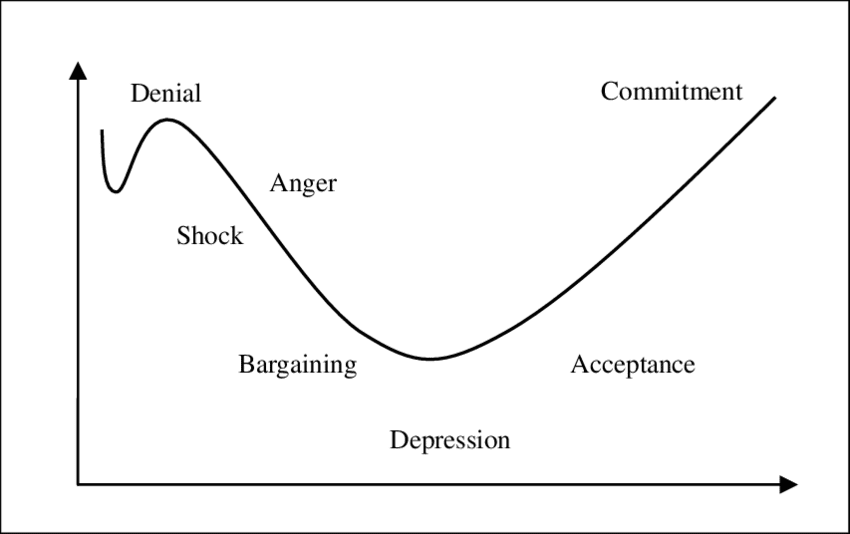
The Kubler Ross model is often described as the 5 stage model of grief management, through the stages of anger, denial, bargaining, depression, and acceptance. Yes, it is. It is also far more than that. The model applies to losses of all kinds, any change, and pretty much many other aspects of human behavior, where we reject things at first sight and then with difficulty come around to accepting what we rejected. It is a model of shifting judgemental ego. It is a process of moving from ‘absence’ to ‘presence’ that Otto Scharmer’s Theory U talks about.
Some years ago, I was in discussion with a coach celebrity. He asked, ‘may I coach you’? I said yes. He then said, ‘I notice that pretty much everything you start with is a ‘no’; are you aware of it? You then say I agree with what you say. What does this mean?’
I wasn’t aware that I started with a ‘no’ quite often, even when I wasn’t disagreeing. It was a defense mechanism to anything that was said to me that I hadn’t thought of. It was unconscious incompetence that came into play when I needed time to process any new information. What better way to buy time than to deny. The alternative for many others is the notorious ‘yes, but’ that means ‘no’.
Denial is a primal human defense. It gives pause, time to reflect perhaps, before one agrees and accepts, seemingly better than taking the risk of nodding to something one is unsure of. This is why it is also the first step when anything new, any change, however minor, is proposed. It is safer to deny and disagree than accept.
Agreeing to something one is unsure of requires confidence, something in short supply in most of us. We are unsure of ourselves, who we are, and where we are. So, we are unsure of the situation we are in and the people we face, and what they offer. The safest option is to build a wall, like some leaders we know. It takes a confident person to say yes to something one isn’t completely sure of, and yet intuitively it feels right. Confidence builds trust and the ability to agree and accept.
When after reflection, we still cannot accept the change, as in grief over the loss of someone or something valuable, we become angry. This is the second defense mechanism. We fight or flee when faced with anything fearful. Anger has value. When directed at an issue rather than a person or persons, such as discrimination of any kind anger is a powerful energy that can move mountains. MADD: mothers against drunk driving, Anti-apartheid, Freedom movements, Black Lives Matter all arise from such anger over loss and grief. Unfocused and undirected anger destroys us.
A modified Serenity prayer helps here. Lord, give me the strength to fight against what needs to be changed and the wisdom to accept what need not. Often it is our greed and wants that demand a change or reparation, not the collective need of a larger number.
It would be so easy if it were that simple to have the wisdom to accept. No, we need to bargain. Quite often we bargain just to feel good that we have done something even when we know that there is nothing we can do to change the inevitable. It is like a catharsis, venting, letting the brown water flow. When the bargaining, complaining, and catharsis one is looking for something that does not materialize, we feel helpless, frustrated, and depressed. Neither bargaining nor depression help in any way. Both are escape mechanisms with no escape route. We merely circle around lie rats in a maze with the inevitable result of self- destruction.
To accept and move on with a change we cannot change and fight is the only common-sensical way to deal with change, loss, grief, or any dispute. But then, who said we have common sense?
What does it take to accept? Acceptance is an emotional response, not cognitive. Acceptance needs trust, confidence, and love in oneself. Most of us are in Maslow’s first four levels seeking to free ourselves of the need to survive, be safe, be validated, and be recognized. Till then we are insecure. The final fifth level of Maslow, self-actualization, is the stage of acceptance. Please read this article.
Self-actualization requires that we move out of our selfish needs to truly collective needs, to the desire to serve, to be of value to the eco-system. When we are in that space we feel fulfilled, and we love ourselves, trust ourselves and in turn trust others.
Another technique that I find helpful is the ABCDE Positive Psychology approach of Martin Seligman. A powerful coaching technique, this approach helps uncover limiting beliefs and reframe them. We shall cover this in another blog.
Do remember, next time you start a sentence with a negative, a ‘no’ or a ‘yes, but’ pause, rewind, and start again. It will save you a lot of grief. It will also help instill a space of trust within you.



